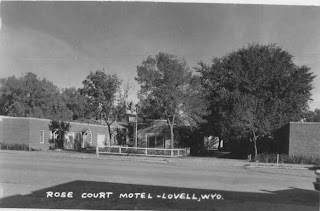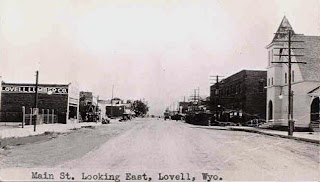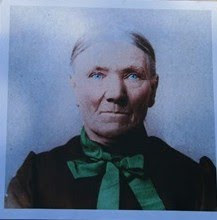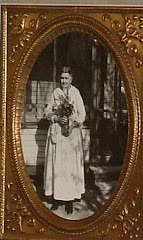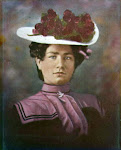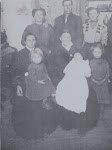Wyoming Meadowlark
Wyoming State Bird
When ever I hear the melodic trill of the Meadowlark, it touches me to my very soul. I am immediately transported to a quieter, more peaceful time and place, and my heart rejoices hearing the sound once again. I remember Grandmother Asay and my mother Delilah Mae repeat the trill of the Meadowlark song, and putting it to the words, "Lovell is a Pretty Little Town," It always brought a smile to their faces and a twinkle in their eye to hear the Meadowlark song, and delighted in telling of Grandpas' love for this "pretty little town". The sweet memory brings a smile to me. Story retold for us by Joye Marostica:
My sister and I occasionally had the opportunity of sleeping over at our grandparent's home. This always delighted us for it was like being in a different land though it was just across town.
To kneel around the big bed with our younger aunts and uncles and grandparents for prayer before retiring made everything seem so right with the world.
In the morning I would often rise early and find Grandma working in the garden. She always welcomed me and we would pull weeds together. I remember her telling me to listen carefully to the Meadowlarks as their song could be heard every morning, and they had a special message to give me. It was, "Lovell is a pretty little town" -- and as I listened of course that was exactly what they were singing!
The town my grandparents chose to raise their family in truly was a pretty little town. the population then as now, many years later, stays at about 2,500. The trees lining Main Street reached over to touch each other. The beautiful blue Pryor Mountains loomed up to the north and to the east rose the mighty Big Horns. People didn't lock their doors and drugs were unheard of. Peaceful is the most descriptive work for the town of Lovell in those days.
It is called the "Rose Town" because Dr. Horsley taught everyone how to plant and care for roses. Not only are roses around all the homes but also at both entrances to the town, where he planted beautiful rose gardens. Dr. Horsley was given the honor of naming the "Peace Rose" by the National Rose Society.
Peace Rose
He was loved by everyone and especially by me because he always remembered my name and the date he delivered me. This amazing man knew these facts for all of the many babies he brought into the world.
My Grandparents were happy to have him for their family doctor and he knew the Asay children well. I'm sure he never for got the time Helen, their youngest girl, slid down the beet pulp silo and had to have literally hundreds of slivers removed.
Sugar beets were and still are the main industry of the town. I will always remember riding to my first Junior Prom in my boy friend's beet pulp truck. The stench is indescribable... it never leaves one's memory!
Entertainment in Lovell for teenagers appears to be almost the same now as when Grandma was being courted by Grandpa. Instead of dragging Main Street in a horse and buggy, however, we now see Hondas, Buicks, Datsuns, and a few motorcycles. Dancing in Grandma's day was on the river bridge; now it has been moved to the open air street dances and the school gymnasium. Picnics by the river have been transferred to the beautiful new city park that even has a swimming pool. We, as well as our grandparents, swam in the canals that are used to irrigate a region that would be desert without them. (Insert by Editor: See the history of the Colonization of the Big Horn Basin by clicking on William Heber Robb and Clara Minnie Simmons)
On the surface there seem to be few big changes. We know, as did Grandmother even in her day, that satanic influences can always be found lurking in the shadows of small towns as throughout the world.
I don't know if Grandma would agree, but I feel the chances of her children growing up without the danger of evil were much better than ours. At least she didn't have to contend with the drug scene, pornography, R rated movies, and the new morality.
Yes, Grandmother knew about the real world, but she also knew what the Meadowlark was saying, and I will be eternally grateful to her for helping me see the pretty things in life.
Little Town
I like to live in a little town,
I like to live in a little town,
Where the trees meet across the street.
Where you wave your hand and say "Hello"
To everyone you meet.
I like to stand for a moment
Outside the grocery store
And listen to the friendly gossip
of the folks that live next door.
For life is interwoven
With the friends we learn to know,
And we hear their joys and sorrows
As we daily come and go.
So I like to live in a little town,
I care no more to roam,
So I like to live in a little town,
I care no more to roam,
For every house in a little town
Is more than a house, its home.
...........................anonymous
...........................anonymous
*************************************
Lovell, Wyoming Rose Town







